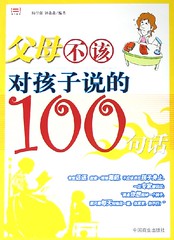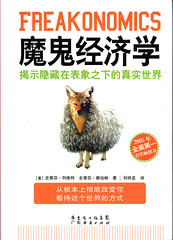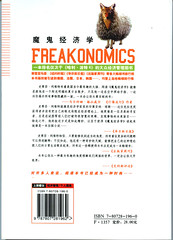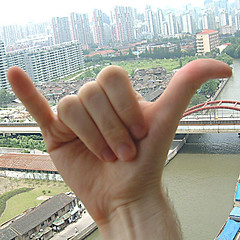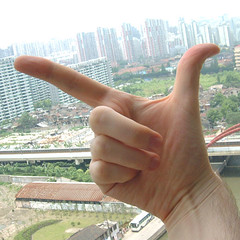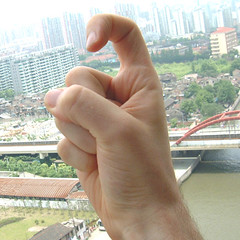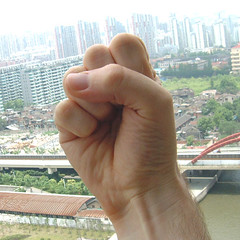29
Jun 2006What Not to Say to Your Kid
Browsing at the new Zhongshan Park Carrefour’s book section, I discovered this book called 父母不该对孩子说的100句话 (literally, “100 Sentences Parents Shouldn’t Say to their Children“). Since I didn’t grow up in China and I almost never watch Chinese TV, I really don’t have much of an idea of what Chinese parents say to their young children. So this book caught my attention. Some of its content is easy to anticipate, but at times also offers tidbits of social insight or even some cultural humor. I’ll share a few of the ones I found interesting (but I’ll spare you the book’s child psychology counseling).
1. 你是从垃圾堆里捡的 (We found you in a trash heap.)
I thought the stork bringing babies was kind of weird, but it’s better than this alternative. The crazy thing is that it seems that the majority of young people in China today are told this by their parents as a joke! They think it’s funny, and the kid believes it. Unbelievable.
2. 你就这成绩以后扫大街去 (With grades like this, you’re going to be sweeping streets someday.)
Apparently in China being a street sweeper is worse than being a garbage man. I think the guys that wash out the septic tank trucks down the road might envy the street sweepers, though.
3. 你怎么这么笨 (How can you be so stupid!)
Classic!
4. 你的脑袋里长草了 (You’ve got grass growing on your brain.)
Chinese caustic creativity.
5. 你看看人家的孩子 (Look at the other kids.)
One of my Chinese friends has told me that she believes that Chinese parents’ constant comparisons between their children and other children are the single most damaging thing to Chinese children’s development.
6. 千万别得罪老师 (Whatever you do, do not offend your teacher.)
Ah, Confucius would be so proud.
7. 别动,等你长大再帮我 (Don’t move. You can help me when you’re older.)
8. 你的任务就是好好学习,其他的别管 (Your job is studying. Don’t worry about anything else.)
This is why modern Chinese kids never have to do any chores or help out around the house in any way.
9. 妈帮你去说对不起 (Mommy will go say sorry for you.)
Yeah, you wouldn’t want your kid to realize he is responsible for his own actions.
10. 我没本事,咱家就看你的了 (I don’t have any real skills. Our family is depending on you.)
No pressure, though.
11. 当心,摔下来我可不管 (Be careful. If you trip, I’m not going to help you.)
Is this supposed to teach independence?
12. 那么难看,你还喜欢 (You actually like something this ugly?)
Sometimes kids need to know they have horrible, horrible taste.
13. 你哪有钱去捐款呀 (Like you have enough money to make a donation?)
14. 你在等我表扬你吗 (Are you waiting for me to praise you?)
Sometimes teaching modesty goes a little too far.
15. 那个人真不是东西 (That person is nothing.)
16. 没事,反正没人看见 (Don’t worry, no one saw us.)
17. 不准失败 (You may not fail.)
18. 你问我,我问谁 (You ask me, but then who do I ask?)
I can’t help but find the thought of saying this to a child funny.
19. 闭嘴,小孩子问那么多干嘛 (Shut up. Kids don’t need to ask so many questions.)
Ah, nipping curiosity in the bud at a young age. This helps prevent the later problem of ingenuity and/or problem-solving.
20. 别问这些不要脸的事情 (Don’t ask about such shameful things.)
Is he asking about the garbage heap, maybe?
21. 你怎么不明白我的苦心呢 (Can’t you understand how much I’ve sacrificed for you?)
The Asian parent guilt game! Gotta love it.
22. 早知道这样,当初就不该生你 (If I had known you’d turn out like this, I never would have given birth to you.)
Ouch!
Clearly, we shouldn’t be too hard on Chinese parents. They have a tough job, and they’re imperfect just like the rest of the world’s parents. But here’s hoping some of these sentences become less common in the future… for the children. (OK, sorry, I’ve never used that phrase before, and I had to do it just once.)
27
Jun 2006The Chaos Run
On the cusp of 2000, I made my first trip to New York City with my friend Alex. We wanted to be in the most exciting place when the ball dropped in Times Square. Some people gave us dire warnings of terrorist threats or Y2K mayhem, but we weren’t worried about that. There was something alluring about the year 2000, and we were two twenty-one-year-olds that would not be stuck in Tampa for it.
For part of our adventure in New York City, we stayed with my friend Dave, a crazy budding director I had befriended in Japan. Dave was a guy that was always excited about something, that loved the 80s, that was fascinated by new toys, and that infected you with his enthusiasm as he leapt from topic to unimaginable topic. He was just the kind of person Alex and I wanted to hang out with in New York.
Our actual New Year’s Eve was a wild ride, but one of the most memorable incidents for me happened well before December 31st, in Grand Central Terminal. Dave led Alex and me into the station during rush hour. The main lobby was magnificent, and it was swarming with commuters. It was at this point that Dave told us about his game.
“This is how you play,” he told us. “Just run, and don’t stop. Keep changing directions so that you don’t hit anyone. It’s a blast!”
“Wait, what?” I started. But Dave had already shot off straight into the crowd. Alex and I quickly followed suit.
We had no time to even notice the reactions of the people around us. There were so many, all melting into a blurry wall, and it was all we could do to avoid collisions as we dodged, weaved, reversed direction, and sidestepped ourselves into exhaustion. Finally we all ended up against a wall, panting and laughing. The masses continued their milling beside us.
This is the kind of thing kids do. Adults reason that it’s silly, that someone could get hurt, that it’s a waste of time. But presented with the idea in the right way, a kid will just try it. And damn, what a thrill.
The way I feel about China is much the same way. This country is like one big Grand Central Terminal. Society is milling about as it always does, but here there are a lot of people doing the chaos run. Some are natives, some are foreigners. Some of them just like the thrill, but many are out for big profits. There is no question that on this scale, the game is very dangerous. Innocent people get knocked down and bowled over. Others run themselves headfirst into walls. And yet, China’s powers of seduction remain unshaken. There’s something about this place that keeps me in a near-perpetual state of excitement. I know there are risks and sacrifices I must face for living in China long-term, and maybe I can’t do it forever, but damn, what a thrill!
25
Jun 2006Jacob's Creek
I regularly ride the subway to get to ChinesePod headquarters, and on each ride I am subjected to the advertising played on those flat LCD monitors. One of the ads I see a lot is for Jacob’s Creek, an Australian wine. I noted that the Chinese name is 杰卡斯.
杰卡斯 is obviously a partial transliteration. 杰 is chosen for its sound and favorable meaning of “outstanding,” and 卡 and 斯, both chosen for their sounds, are commonly used in transliterations of foreign words.
After seeing this Chinese name enough times, the thought occurred to me: the English name which most closely matches the Chinese transliteration 杰卡斯 is not Jacob’s Creek, but Jackass.
23
Jun 2006Blog Awards and Danwei
I have been asked to help spread word about some Chinese blog awards. I have to admit I don’t pay much attention to these myself, but I do think they’re a good thing. And in one case, you can actually win real money! (Well, real monopoly money, anyway.)
Best China Blogs is the China blog awards event giving away close to 10,000 RMB (over US$1000!). “The Admiral” of China Moon is organizing it. (Some of you might know him as a regular commenter on TalkTalkChina.)
I noticed on Danwei that there’s another Asia Blog Awards going. AsiaPundit is a great blog (I wish I had time to read it more often), so I’m sure it’ll do a good job.
And finally, I just have to comment on Jeremy’s post on Danwei:
> Danwei probably does not count as a blog any more: there are too many contributors, and we are trying very hard indeed to sell out, by accepting advertising. If you are interested in this type of award, please vote for another website.
First let me say that I love Danwei, and it’s a truly excellent site. You’d be hard-pressed to find a better group of dedicated people putting out original, quality content for an independent website (ESWN is only one person, and arguably superhuman). But I don’t think that saying “we’re not a blog anymore” works.
The reasons Jeremy gave as to why Danwei is not a blog don’t stand up to even mild scrutiny: many blogs are group blogs, and many blogs sell advertising. (No, I don’t mean just Google Ads; there are plenty of blogs that sell real advertising.) So what’s the deal?
Well, I think it’s clear that Danwei very much wants to be seen as a news source. Danwei TV has taken a big step in that direction. The Danwei team obviously works very hard and puts out excellent researched content. Blogs are often seen as childish or faddish, and Danwei perhaps aims to rise above the label because it quite clearly offers content superior to 99% of the blogs out there. If any blog ever deserved to transcend the blog label, it is certainly Danwei.org.
But can you cease being a blog simply because you don’t want to be seen as one anymore? I’m not sure what it would take for me to see Danwei.org as something other than an excellent blog with some non-blog features, but for me, at least, it’s not there yet.
22
Jun 2006Mother-Daughter Chitchat
The other day in the subway I couldn’t help but overhear this mother-daughter “dialogue” as I was going up the stairs.
> Mother: 男人要胖。女人要瘦。 (Men need to be fat. Women need to be thin.)
> Daughter: …
> Mother: 你胖得已经像男人了。 (You’re so fat you’re already looking like a man.)
> Daughter: …
I couldn’t help taking a look at the daughter. She wasn’t skinny, but she wasn’t either obese or manly. She was probably not much above average weight. She also didn’t seem very bothered by her mom’s comments.
It’s more than just the food….
20
Jun 2006Freakonomics in Chinese
Last night while on an evening stroll around Zhongshan Park I was surprised to discover that the pirated book man (he pushes his goods around in a big cart) had a copy of the Chinese version of Freakonomics.
The book was good quality, except for the occasional misalligned printing which plagues pirated books. The cover certainly looks fine, although I was disappointed to see the trademark apple/orange image (see the book’s own website if you’re unfamiliar with the book) replaced by the lame wolf/sheep image. Why would they do that?
The other thing is the name. The translator chose to represent Freakonomics, a blend of the words “freak” and “economics” as 魔鬼经济学, which literally means “devil economics.” OK, so the name Freakonomics is hard to translate, but “devil economics?” Yet another translation challenge unmet. Maybe 惊济学?
19
Jun 2006End of Semester Vacuum
It’s the end of the semester. You might expect me to be busy with schoolwork, but I’m really not especially busy because all three of my graduate-level courses are based on essays which don’t need to be turned in until the beginning of next semester. So I have all summer to work on those. The one undergrad class I’m taking to make up credit, Modern Chinese (现代汉语), does have an exam. So that’s probably the only traditional exam I’ll have to take at ECNU.
Despite the lack of exams, I find myself very busy. I’m busy with ChinesePod as well as with a variety of other things. Most of all, my mind has been extremely busy lately, mulling over all kinds of developments. Maybe at a later date I’ll write about some of those things, but for now the time spent on personal reflection is usurping the time I might spend on quality blog writing.
I must say, though, that Joel Martinsen at Danwei.org has been writing some really great stuff lately. It’s great to have him combing the Chinese web for us. His latest gem is the translation of a story he calls Disability Certificate (scroll down to the story, at least, if you’re not interested in the analysis). Whether or not the story is true, I think it really captures some truths about China.
17
Jun 2006Shanghai Carrefour Showcase
I found this 8-page Carrefour ad in my mailbox the other day, and I thought I’d scan it and share it. For those of you not in the know, Carrefour is a French supermarket chain that is super popular here in the PRC. It just recently opened at its new Zhongshan Park location in Shanghai. Anyway, I would think that this these pages might be very interesting for anyone interested in China, Chinese, or Shanghai.
Highlights:
– Page 3: find out once and for all what the price of eggs in China is.
– Page 4: the chicken’s not fresh unless the head is still attached.
– Page 5: the electric bug swatter is one of the coolest things you can buy in China, period.
– Page 8: maps and bus schedules! (Micah is loving this page even if no one else is.)
I have added a few of my own comments on the individual pages on Flickr. Note that on the individual pages for each scan on Flickr you can click on the “all sizes” button to see a much larger version of each image. You may just want to go to the Flickr Shanghai Carrefour Ad set page.
16
Jun 2006Two Minor Disappointments
The pizza I most often eat in Shanghai is Hello Pizza‘s. It’s not the best, but at only 10 rmb for a 9″ pepperoni or Hawaiian pizza, it can’t be beat. Thrifty pizza scarfer that I am, I’ve been a big fan of Hello Pizza ever since I moved to Shanghai.
So the other night I ordered pizza for dinner. Imagine my horror, then, at being told that the pepperoni pizzas are now back to 15 rmb (!) and the Hawaiian pizzas are now 18 rmb (!!!). Noooo… (The price changes haven’t made it to the online menu yet, apparently.) I guess those ridiculously cheap prices were really just too good to last. Even with the recent price hike, the pizzas are not even remotely expensive. The only decent pizza place I know of that can compete is the New York Pizza place in Jing’an Temple Plaza.
Actually, this price hike might be a good thing for me. I used to like to have pizza and salad from Hello Pizza for lunch, but since the minimum order for delivery is 30 rmb, I would get two pizzas. One pizza with a salad is enough of a lunch for me, but I would almost always end up completely devouring both pizzas. I think maybe I have some of those genes responsible for the tendency to eat a whole goddamn bag of chips.
Then last night I went with some friends to check out the new Tanghui (堂会). I used to really enjoy the old bar, but I hadn’t been to the new one yet. (That didn’t stop me from talking about it with Brad and Aric for GigShanghai though.)
I think the new Tanghui is really cool, but it’s a totally different bar. I felt like it shouldn’t even be called Tanghui. The intimate dive I once knew is gone, and now there’s this fancy new four-floor bar. One thing that I was happy to see unchanged was the Tiger on tap for 30 rmb* a mug. I’m sure I’ll be back to Tanghui in the future, but I think I’ll continue meeting most of my live music needs at Shuffle.
* Hey, that’s the cost of two pepperoni pizzas at Hello Pizza, even at the new prices.
14
Jun 2006Unexpectedly Pregnant
The other day in one of my classes the professor was talking about innocent phrases having unintended meanings for non-native speakers of Chinese. His example was 有了, which on the surface seems to just mean “to have something now that one didn’t have before” (to put it verbosely) but in everyday usage actually means “to be [newly] pregnant.”
It’s a fairly common phrase, so it’s easy for the unwary learner to either inadvertently declare pregnancy or to be confused by someone else’s pregnancy announcement. (“Huh? What do you have?”)
I was thinking this was a circumstance peculiar to Chinese, but the same day my professor talked about 有了 in class I got a new comment on my Chinese blog. I had written about my plans to post English-Chinese translations of “non-mainstream Western culture” there (the first one is up!). One of my Chinese readers left a supportive comment in English that reminded me that the issue also goes the other way as well. The comment read: “I’m expecting.”
[Sidenote: I don’t have any personal experience in this, but it seems to me that in English, the expression “I’m late” serves the same function as 我有了. Is there some kind of natural law that the “breaking the news to the father” line must be vague and ripe for misunderstanding??]
13
Jun 2006我们还以为民族国家不是个好主意
Propagandhi是一个加拿大朋克乐队。它的名字来自propaganda(宣传)和Gandhi(甘地)的混合(语言学术语叫截取式造词法)。Propagandhi强烈反对法西斯主义、种族主义、帝国主义、资本主义等等,而且乐队成员都是素食者。
我跟同学一起翻译了这首歌。
> Propagandhi – 我们还以为民族国家不是个好主意
> “公款资助!私人利益!”
这就是至高无上的傀儡师的圣歌。
注意一下,点头同意,
把头埋在新殖民地主义者的条形码里。
我们以前的仇人——民族国家的魅力,
现在为新的集权募捐。
再试一次,但这次我们很迷惑:什么是“阶级战争”?
这是阶级战争吗?对,是阶级战争。
> 而我只是孩子……
我不相信我还得为这种屁事烦恼!
这么蠢的世界!
它真美啊……一点也不关心原则。
这么蠢的世界。
> 出生,被雇佣,被扔掉。
那份工作到哪里去了,大家都知道,
你从总裁的笑容看得出
环保限制快完蛋了。
法律肯定会保证无限制劳动法的利益
(被流亡政府的敢死队保护)。
> 他们占有我们。他们占有我们,生产我们,消费我们。
他们占有我们。他们占有我们,生产我们,消费我们。
> 他妈的你能相信吗?
这么蠢的世界。
操他妈狗屁阶级忠诚秀。
媒体和”我们的”领导人都把它包在狗屁国旗里游行。
12
Jun 2006China: Alternative Film Showcase
You know what the cool thing about buying DVDs in China is? I mean besides them only costing US$1. You may get stuck with bad copies if you buy from unscrupulous vendors (or if you’re too impatient), and not every mindless comedy makes it to the streets of China, but I am continuously amazed at the obscure stuff that does make it here. Any China expat can tell you stories of finding some really random old movie from his childhood on DVD in the unlikeliest corners of China.
Just recently I found The Ewok Adventure (1984) on DVD bundled with Ewoks: the Battle for Endor (1985). I grew up in the 80s, so ewoks were an important part of my childhood. I picked up the two-disc set. I was disappointed to discover that the contents of the DVDs did not match the DVD covers; it was the short-lived ewok animated series I had actually bought. Laaaame. (I may have a soft spot for certain 80s nostalgia, but I do have my limits.)
Bad 80s made-for-TV movies aside, all the exposure to less mainstream films is great. Some DVD shops seem to specialize in obscure movies. I’m not sure if the selection is intentional or if they somehow get stuck with the “dregs” of the DVD shipment. I see quite a few French films, but stuff from all over as well.
Two movies I watched over the weekend:
Les Revenants, AKA They Came Back (France, 2004). I was intrigued because this was a zombie movie with very different zombies. French zombies. And they didn’t attack people or eat brains–they just came back… only they were a little odd. This had serious psychological consequences on the loved ones to whom they returned. Pretty interesting movie, but it dragged a bit in the second half and didn’t have a very satisfying ending. Also, I kept waiting for a zombie to flip out and chomp on someone’s living flesh, and it never happened. At least this movie had good English subtitles, so it was only weird French cinematic metaphors for life and death and acceptance (or whatever) that were confusing me, and not language as well.
Tsotsi (South Africa, 2005). I picked this one up because I really know very little about South Africa (ignorance is bad), and I kind of wanted to hear the African hip hop mentioned on the back. I also had the foolish hope that the movie would be in English, so I didn’t check for English subtitles. Instead I was treated to 94 minutes of Afrikaans, with no English subtitles. Actually there was very little dialogue in the movie, though, so the Chinese subtitles gave me more than enough to follow the story. I definitely enjoyed this one.
09
Jun 2006忙啥?
我已经一个多月没有更新中文博客了。不仅有些人很急切地想看到新的文章,而且我自己也觉得有些忽略了中文blog。但我并没有蹉跎岁月。
我一直很喜欢教英语,但是我发现我更喜欢学习汉语,从而仔细观察自己学会一门外语的过程。尽管我对语言学的各种问题都感兴趣,但最吸引我的是对外汉语。所以今年有了机会跟ChinesePod合作,我就”上了贼船”了。不幸的是,这样一来我写blog的时间比原来更少了。
其实现在我有许多东西想写。不少会中文的外国人(或者是会英文的华人)喜欢向西方介绍一些中国诗歌、歌曲、文章、连续剧等。在我的英文blog上,我偶尔也会这样做,但是我更想向中国人介绍一些非主流的西方文化。作为外国人,我当然不太善于把英文翻译成中文,但幸好有中国同学愿意帮忙。下次就给大家看看我们第一次的成果。
09
Jun 2006Lazy Friday Links
I’ve written a few articles elsewhere lately (mostly for ChinesePod), so rather than write real new content this Friday, I will take the lazy way out and link to some things I’ve already written.
1.
When to Learn Hanzi? (on CPod)
Could it possibly be that studying Chinese characters full-on from the very beginning is not the best way to go?
2. Talking to Oneself Productively (on CPod Praxis)
It’s not exactly a revolutionary new method, but talking to myself has helped me to learn Chinese.
3. On Google’s Evilness (on iDrone)
Light-hearted speculation on Google’s current and hypothetical migration toward evil (with regards to China).
07
Jun 2006surfer, muppet, gun, redrum, fist
I recently stumbled across Copperpoint’s awesome reference to the Chinese “hand gestures” for numbers 6 through 10 (via Meg). I felt the method really needed a visual aid, so I took the liberty of creating one (complete with an awesome Shanghai background). I also realized that if Copperpoint’s message was to be taken from just funny to useful, it needed some more mnemonics connecting the gestures with the numbers and/or the Chinese words for them. So I took the liberty of creating those as well. It was a bit of a stretch in some cases, but here we go anyway…
Surfer. The surfers in Hawaii make this hand gesture, which means “hang loose.” So while the surfers are hangin’ loose in Hawaii, you can be hangin’ liùs in a Chinese market (liù means 6). Also, the numeral “6” looks sort of like a growing wave (whereas “9” looks like a crashing wave, which is no good to surfers), so that can remind you of surfers too.
Muppet. It’s like a muppet skeleton. A muppet bereft of flesh. The shape of a hand in a puppet even looks kind of like a “7,” doesn’t it? What are muppets, if not tools to deceive (欺骗, or “七”骗) children and pull them into that make-believe world? I just hear the amazed children now, going “gee…” (qī means 7).
Gun. It definitely looks like a gun. You ever had a double-barrell shotgun in your face? Me neither, but the muzzle kind of looks like an 8 on its side. And what sound does a gun make? Bang! (bā means 8).
Redrum. The foreshadowing of the violence to come. 10 is the fist, and 9 comes right before the fist, so it’s very similar to the fist. And do you remember the name of Jack Torrance’s little boy in The Shining? Well, can we just pretend it was Joe, because that sounds an awful lot like jiǔ (9). Thanks.
Fist. 10 is completion and power. 10 is also the number assigned to the “perfect woman” (that only bad, bad sexist men would ever use). And what do those sexist men do over a “ten?” They fight each other. With their fists. And then the last guy standing gets the girl (hey, she’s pretty, but not too bright), and he goes gaga over her, so whatever she asks him to do he just says, “sure” (shí means 10).
Ok, this may seem like a completely ridiculous exercise, but I can assure you that after exerting that much “brain power” over it, I will never, ever forget those hand gestures. (I used to forget them a lot.)
There is another page on Chinese Number Gestures at Chinese-Tools.com, but I should warn you about that page first:
1. He doesn’t have the cool cityscape background photos for his hand photos.
2. His photos are small, and you can’t click on them to see a huge version on Flickr that you just might need.
3. He has photos for numbers 1-5 as well, but if you don’t know those already you’re dumb.
4. His thumb doesn’t have that cool backwards curve to it that mine does (or is he just trying to hide it?).
5. The one he has for 10 I’ve never seen before.
Go to the Wikipedia entry for more info on issues like “number gestures in Taiwan vs. the mainland” (but not awesome pictures).
Finally, to close, I would like to share a link for an “ancient Chinese number system” which supposedly allowed the Chinese to count up to 100,000 on one hand. I don’t really understand how this is supposed to work short of sticking acupuncture needles in your hand (which would require an extra hand). It appears to me to be complete and utter bullshit. Enjoy.
05
Jun 2006Pepe
For the two years of classes I must take for my masters program at ECNU, I have the same 11 classmates for almost every class. All of them are Chinese, and only one of them is male. My one male classmate distinguishes himself by far more than his gender, however, so I’d like to introduce him here. I’ll call him Pepe.
Like most of my classmates, Pepe is not from Shanghai. After finishing his undergraduate studies, he came directly to Shanghai to study applied linguistics. Faced with a difficult job market, more and more Chinese college grads are electing to go to graduate school before joining the rat race. In that respect he is not very special.
I first observed something about Pepe in our initial semester, when I had only one specialized linguistics class. I noticed that in a room full of students furiously scribbling the teacher’s every word–and I doing my darnedest to keep up–Pepe never wrote more than a few lines of notes down. And yet no one was more engaged than he, no one impressed the professor more with insightful comments than he, and no one got away with more good-natured irreverent remarks than he. There were times when the professor would make a statement in all seriousness, and Pepe would laugh at it out loud, all alone, earning him a dirty look from the professor. He obviously understood a lot that the other students didn’t.
I would later learn that one of Pepe’s favorite pastimes was combing through Hong Kong and Taiwanese news. He loves the idea of a government under the scrutiny of a Chinese free press. He’s a realist, so he dares not dream of the impossible, but he devours the outsiders’ analysis of the CCP’s power struggles, past and present. What interests Pepe most of all, however, is Taiwanese politics. It’s like politics in bizarro China, and it fascinates him.
I have also learned about Pepe’s struggles within the academic machine. He wants to do real scientific research, to make a creative contribution to the field of linguistics. But his advisor repeatedly swats down his aspirations because “that’s not the kind of thesis that gets approved in this department” or because of the limitations of his advisor’s expertise.
Pepe is the sort of student I always hoped for more of when I taught English to Chinese students, and he’s the sort of student China would benefit greatly from if it could only recognize the importance. I’m fortunate to have at least one classmate who thinks critically and shares my grievances with the system, discontent with the role of academic atomaton (although to be sure, this burden weighs far heavier on him than on me).
You will hear more about Pepe from me in the future.
03
Jun 2006Chinese Girl Pop Stars du jour
And now for something completely vapid: Chinese girl pop stars!
I was bored, surfing around on Baidu, as I sometimes do, and I stumbled across this Baidu ranking of female pop stars. The ranking is assigned by searches, and each star is linked to photos, discussions, and “星闻” (a pun on 星 and 新闻, meaning “star news”). It even keeps track of changes in the rankings.
I immediately noted two things about the list. First, I knew a whole lot fewer of the stars than I expected to. I mean, I don’t exactly immerse myself in Chinese pop culture, but I thought I would know most of the top ten. I found that I only knew four of them by name. Second, the list is quite different from the recent list of China’s 50 Most Beautiful People. This is to be expected; the lists had different standards, after all. Or, one actually had standards, I should say. But it’s interesting to compare anyway.
First, though, for purely educational purposes, I present you with Baidu’s top ten:
刘亦菲. I had seen this girl everywhere in advertising around Shanghai, and had no idea who she was. Apparently this 20-year-old is pretty popular these days (#1 on Baidu, anyway). She has a movie called 五月之恋 (“Love of May”) which you can watch in its entirety on YouTube (Chinese only).
蔡依林 is a Taiwanese pop star I’ve written about before. She’s managed to stay popular for quite a while. There are karaoke-style videos of hers on YouTube as well, such as the video for Love, Love, Love. (I hope you have a strong stomach if you’re thinking of clicking on that link.) She was so much cooler when she was dating Jay Chou (周杰伦).
李宇春. Anyone living in China should know this face. She won the “Supergirl” singing contest last year. I’m not going to say anything bad about her ever again because her fans are crazy. They will crush me. You can find her on YouTube as well.
汤加丽. I don’t know anything about this woman and I’m too lazy to search. She’s only #4, after all. Judging by her photos on Baidu, though, I’m guessing she’s popular because she does nudes. (Sorry, guys, she’s not on YouTube.)
S.H.E. #5 is a trick, because it’s actually three girls. (No one ever said Baidu was smart.) This is a girl band you’re likely to know if you’ve lived in China any length of time. They’re well known for that Superstar song, and currently annoying everyone on the Shanghai subway as their cutesy girl antics are played on the video screens ad nauseum. Surprise, surprise… there are tons of their videos on YouTube.
张娜拉. I have no idea who this girl is, but I did just enough research to discover that she’s Korean, her “real name” is Jang Nara, and she’s on YouTube.
林志玲, who goes by the crazy moniker of Lin Chih Ling in Taiwan, seems to be unable to wear a bikini and stand up, causing her to just roll around on the ground in a giddy delirium. Those so inclined can do more research on this intriguing woman on YouTube.
张含韵. I once posted a video of hers on ChinesePod without even knowing her name for sure. Now I know her name, but still find myself distinctly apathetic about the details of this young woman’s life. She is #8. Run along to YouTube, lads. If her video for “ai ya ya” is any indication, she wants to cute you to death.
林心如. This Taiwanese actress has been popular for a while, it seems. I know she’s been trying to steal my roommate’s heart back away from Zhang Ziyi for some time, anyway. You can find her on TubeYou, or whatever that site was called.
张韶涵 is our #10. Knowing absolutely nothing about this girl, I can still tell you two things: (1) she is annoying, and (2) she is on YouTube.
OK, that’s Baidu’s top 10. The full list has 50. Some major differences between it and the women of the “50 most beautiful people list”:
1. Zhang Ziyi, #4 on “Most Beautiful” is #36 on Baidu’s list. OK, so Chinese guys like her a lot less than American guys, but they don’t hate her (unless maybe their girlfriends are around).
2. Zhang Manyu (Maggie Cheung), #1 on the “Most Beautiful” list, is #46 on Baidu’s list. (I’m guessing that’s because she’s old.)
3. Neither Li Bingbing nor Zhou Xun, placing #17 and #23 on “Most Beautiful,” respectively, place on Baidu. I found that kind of strange, because I thought they’re both somewhat popular still. (Too last year?)
4. Liu Yifei, #1 on Baidu’s list, placed 13 on the “Most Beautiful” list.
5. Lin Zhiling, Baidu’s #7, is #26 on the “Most Beautiful” list.
6. Shu Qi is #15 on the “Most Beautiful” list and #21 on Baidu’s list.
7. Wang Fei (Faye Wong) is #18 on both lists.
8. Zhang Baizhi (Cecilia Cheung), always popular, placed #13 on Baidu and #25 on the other.
I could go on and find some more overlap, but there’s not much point. A handful of stars aside, the lists are significantly different. It’s almost as if the young male crowd thronging to China’s internet cafes and using Baidu prefers young, pretty girls, regardless of talent!
Shocking.
01
Jun 2006Pu-what-hua?
Maybe this is a tired old Shanghai joke, but I just heard it last week in class.
A: 他的普通话怎么样? How is his putonghua?
B: 他的浦东话很好。 His Pudong-hua is very good.
Ah, with the subtle change of just one consonant sound from aspirated to non-aspirated, you have fully answered the question with an apparent non-sequitur.
Pragmatics class can be pretty interesting. Occasionally.
30
May 2006Three Guns
What would you expect a store called “Three Guns” (三枪) to sell? If you guessed clothing, you guessed right! Just in case there’s any confusion as to what the name of the shop refers to (could it be some kind of literary reference or something?), the logo clears that up.
Still unsatisfied, I went inside and talked to one of the employees. “Why would a clothing store call itself ‘Three Guns?'” I asked. The employee kindly told me that the brand had a long history dating all the way back to before the Communist Revolution, and that the original founder had liked guns. So he named his clothing store “Three Guns.” The end.
Charming.
27
May 2006The Myth of Round-eye
We English speakers have at our disposal an astounding variety of racial slurs. I don’t need to give a list here; we all know it to be true. I think one of the most interesting slurs is “round-eye” because it seems to be invented by the very group of people to whom it refers.
If you’re not familiar with the term, it frequently shows up on racist websites or websites that play up the East/West divide (but not on certain ones–more on this below). It is also used seemingly innocuously at times. It’s supposed to be a term that Asians use for non-Asians.
It may be obvious to many Asians, but as a white American, I didn’t notice anything strange about the way the term is used until after living in China for some time. The truth is, I’ve never heard any Chinese (or Japanese) refer to whites or any non-Asians as “round-eyes,” in Chinese or any other language. At times non-Asians in China might get called hairy, simian, uncivilized, or even evil, but never round-eyed.
The reason for this is simple. While non-Asians often see Asian eyes as “slanted,” Asians do not see themselves that way. If you ask a Chinese person about the difference between Chinese and white people’s eyes, for instance, they will tell you that white people’s eyes are often blue, but Chinese eyes are “black.” In addition, white people’s eyes are usually much deeper set, and all seem to have the “double eyelids” that the Chinese find attractive. What they don’t say is that “their eyes are rounder than ours.”
I think it’s pretty obvious where this racial slur came from. The logic went something like this:
> Asians have slanted eyes, but we don’t. Asians’ most readily identifiable feature, to us, is their slanted eyes. So our most readily identifiable feature to them must be our non-slanted, or round, eyes. We can’t understand what they call us in their languages, but it’s gotta be round-eye!
The fact is that the Asians themselves just don’t see it that way. I’ll admit that I’m basing most of what I’m saying on my own personal experience in China, and to a lesser extent my experience in Japan. It’s possible that some groups of Asians use this term, maybe as a reaction to being called “slanty-eyed” by racists. However, I suspect that it is a wholly non-Asian invention, and that the most likely Asian groups to use it would be ones living as minorities in the West.

